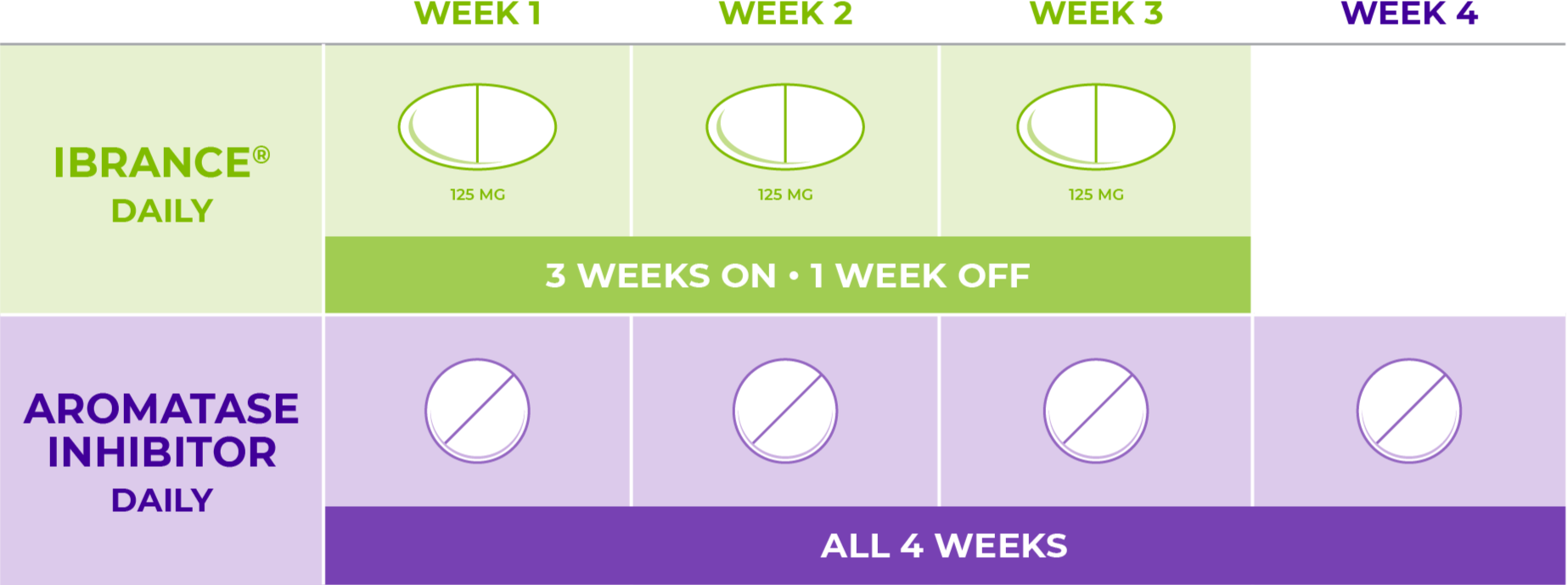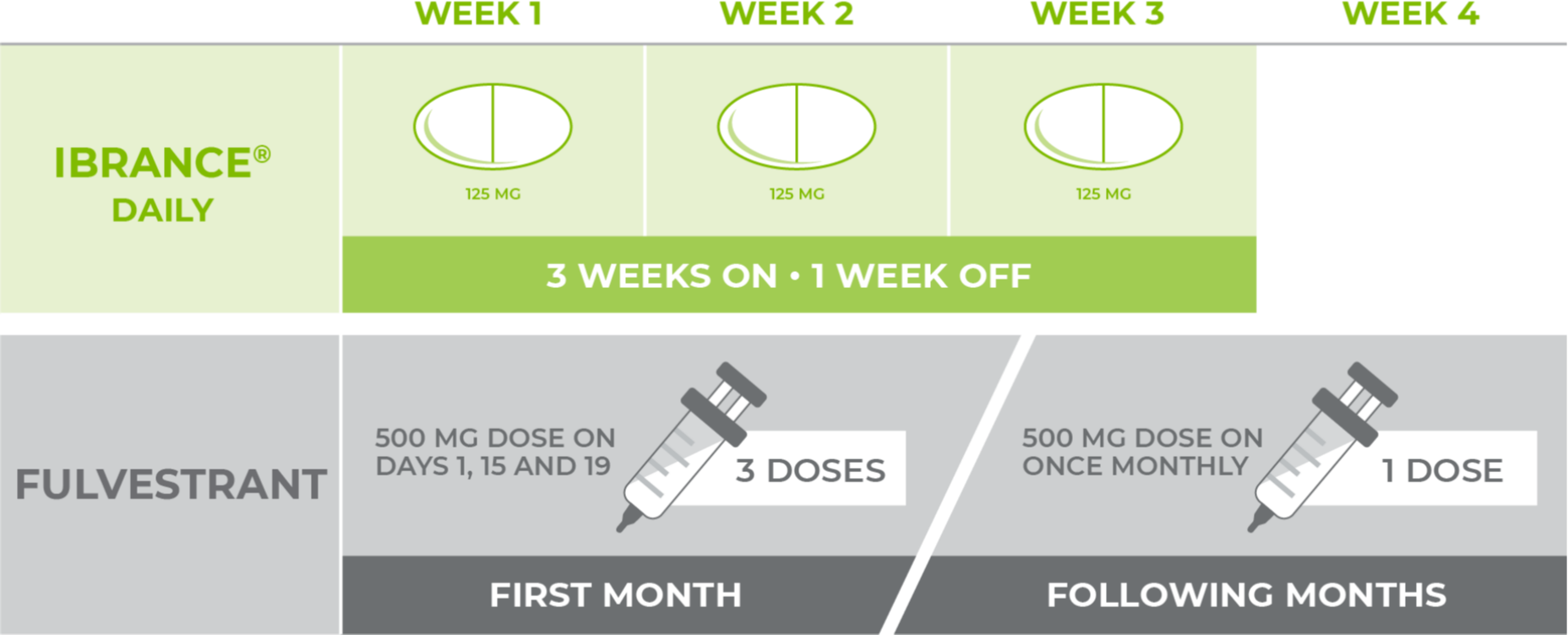Taking IBRANCE®
What should I tell my doctor before I start IBRANCE® (palbociclib)?
Before taking IBRANCE ®, it’s important to talk to your doctor about any health issues or other medications you are taking, including prescription medicines, over-the-counter medicines, vitamins and herbal supplements. IBRANCE ® and other medicines may affect each other and cause side effects 1.
Additionally, before you take IBRANCE ®, tell your doctor if you 1:
- have fever, chills, or any other signs or symptoms of infection
- have liver or kidney problems
- have any other medical conditions
- are pregnant or plan to become pregnant; IBRANCE
® can harm your unborn baby.
- Females who are able to become pregnant and who take IBRANCE ® should use effective birth control during treatment and for at least three weeks after stopping IBRANCE ®.
- are breastfeeding or plan to breastfeed; it is uncertain whether IBRANCE ® passes into your breast milk. You and your doctor should decide if you will take IBRANCE ® or breastfeed. It is NOT recommended to do both simultaneously.
How do I take IBRANCE® (palbociclib)?
Always take IBRANCE ® as exactly as directed by your doctor 1.
IBRANCE ® is taken in 28-day (4-week) cycles 1.
The recommended dose of IBRANCE ® is one 125 mg tablet taken orally once a day for 21 days (three weeks) followed by 7 days (one week) off treatment 1.
IBRANCE ® is available in 125 mg, 100 mg and 75 mg doses. Your doctor will prescribe the most suitable dose according to your condition and needs.
You should keep taking IBRANCE ® until told to stop by your doctor. 1
-
Dosing for IBRANCE® +
aromatase inhibitor (eg letrozole)1,2 - Dosing for IBRANCE® + fulvestrant1,3

- For the first 3 weeks (21 days): take one IBRANCE ® tablet and one aromatase inhibitor pill, once a day.
- For the fourth week (7 days): take only the aromatase inhibitor – one pill, once a day.
- At the end of 4 weeks, start the cycle again.
Even though you will stop taking IBRANCE® for the last week of each cycle, your aromatase inhibitor should be taken every day throughout your therapy. It should even be taken if your doctor stops your treatment with IBRANCE or adjusts your dose.2
If you take too much IBRANCE®, call your doctor immediately or go to the nearest hospital emergency room1.

- For the first 3 weeks (21 days): take one IBRANCE ® tablet once a day.
- For the fourth week (7 days): do not take IBRANCE ®.
- At the end of 4 weeks, start the cycle again.
Fulvestrant is an intramuscular injection that is administered by your doctor or nurse.3
Each dose is given as 2 injections. Fulvestrant requires 3 doses during the first month of treatment. Your doctor will give you one dose on days 1, 15, and 29 of the first month and then a single dose once a month thereafter. 1
Discuss scheduling your injection appointments with your doctor or nurse.
If you take too much IBRANCE®, call your doctor immediately or go to the nearest hospital emergency room1.
TIPS FOR TAKING IBRANCE® (PALBOCICLIB)1
What monitoring will I need while taking IBRANCE® (palbociclib)?
A regular blood test to check your complete blood count (CBC) is used to monitor for side effects and is the most common monitoring requirement for IBRANCE ®. However, your doctor will determine if any additional monitoring is needed. 1
You will need to have a complete blood count (CBC) before starting IBRANCE ® and each month at the start of each new treatment cycle. 1
For the first 2 treatment cycles, you will also need a complete blood count on day 15. 1
Discuss your IBRANCE ® treatment schedule with your doctor or nurse so they can schedule your CBC appointments at the right time.
If your test results indicate a low white blood cell count (neutropenia), your doctor may temporarily stop your treatment, decrease your dose, or tell you to wait to begin your treatment cycle. 1
Doses might be modified throughout treatment. Be sure to follow your dosing schedule exactly as your doctor prescribes and talk to your doctor if you have any questions about monitoring.
How can I manage IBRANCE® (palbociclib) side effects?
Always tell your doctor or nurse how you are feeling and about any side effects you are experiencing. They can advise you how to best manage them. Some side effects can be can be serious – your doctor may adjust your IBRANCE® dose to help reduce any side effects that are unmanageable.
- Infection1,4
- Mouth sores5
As neutropenia is a common and sometimes serious side effect of IBRANCE® treatment, it is important to protect yourself against infection throughout your treatment. It will help to:
- Wash your hands frequently
- Wash all vegetables and fruit before eating and store all food at the correct temperatures
- Avoid exposure to people who might be sick
Tell your doctor immediately if you develop any signs and symptoms of an infection such as fever or chills.
Check your mouth and tongue daily for sores, white spots or infection, and inform your doctor or nurse about any changes. Some tips that may help:
- Avoid tobacco, alcohol, and spicy and acidic foods
- Eat foods that are soft and easy to chew or swallow
- If you have mouth pain, try sucking on ice chips or frozen sweets
See more tips on
managing common side effects of breast cancer treatment
.
References
- IBRANCE®(palbociclib) Tablets Prescribing Information. Pfizer Corporation Hong Kong Limited. Version: January 2021.
- MIMS. Femara full prescribing information. Retrieved from
https://www.mims.com/hongkong/drug/info/femara?type=full.Accessed 13 May, 2022. - MIMS. Faslodex full prescribing information. Retrieved from
https://www.mims.com/hongkong/drug/info/faslodex?type=full. Accessed 13 May, 2022. - The American Cancer Society (2020). Watching for and preventing infections. Retrieved from
https://www.cancer.org/treatment/treatments-and-side-effects/physical-side-effects/low-blood-counts/infections/preventing-infections-in-people-with-cancer.html. Accessed 13 May, 2022. - National Cancer Institute (2018). Eating Hints: Before, during, and after cancer treatment. Retrieved from
https://www.cancer.gov/publications/patient-education/eatinghints.pdf. Accessed 13 May, 2022.
Disclaimer
The information enclosed is for your understanding of the disease and is provided via your Healthcare Provider. The information is for patients who receive Ibrance®. It cannot replace a consultation with medical professional nor as a basis of self-diagnosis or for treatment decision. Please consult your doctor for more information.
Ibrance® is a prescription only medication. The effectiveness and side effects to medication may vary among individuals. Please consult your doctor or your pharmacist for more information.
Drug Safety
How to report adverse events of Pfizer products?
Patient safety is of paramount importance throughout the life cycle of a medicine - and pharmaceutical companies have ethical and regulatory responsibilities to monitor the safety of the products they sell for as long as they are used by consumers anywhere in the world. The Drug Safety Unit at Pfizer Corporation Hong Kong Ltd addresses product experience reports /including adverse events. If you have any experience pertinent to the above, please contact us at +852 2811 9711 as soon as possible.
Medical Information Contacts
Our colleagues at Medical Information are glad to help you understand more about our products. If you have any medical information-related questions (other than pricing, ordering, purchasing), please e-mail our Medical Information Services.
E-mail: [email protected]
General enquiry
Address: 21/F., Kerry Centre, 683 King's Road, Quarry Bay, Hong Kong
Tel: (852) 2811 9711
Fax: (852) 2579 0599
Website:www.pfizer.com.hk




